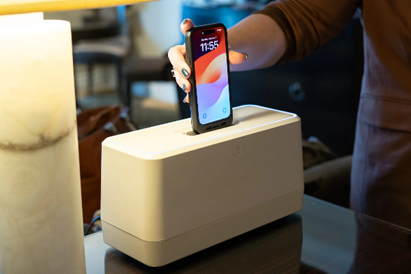At the beginning of this school year, students were introduced to what has since become the subject of fervent debate and controversy: the new cell phone policy. Previously, cell phone policies had varied by teacher. But this year, Davis High School has united with schools across the state in accepting and supporting a new law that bans cell phone use in the classroom. What does this law actually look like? Why was it necessary, if it was at all? And can we predict its consequences?
The new ban on cellphones in the classroom is state law, but the law leaves exactly how phones should be banned up to more local levels. Davis High School has decided that the use of cellphones is prohibited in the classroom setting (Davis School District Policy and Procedures).
Was this law necessary? Some argue yes. The use of cellphones in the classroom was undoubtedly a problem, and the strict ban (assuming it is enforced) could be the firm hand students need to break the habit. Cellphones, and more specifically social media and other games, have been found to be addictive, an addiction that can lead to a plethora of other problems.
The resulting symptoms and students’ constant need to have their phones have been argued to affect education. If teachers let students keep their phones, many students struggle to keep them in their backpacks. But if teachers take away students’ phones, many get “nomophobia,” or anxiety from not having your phone because it is an addiction like any other. Either students are distracted by their phone or distracted by its absence.
People in favor of the new cell phone policy argue the ban will break the addiction, not only keeping students focused on learning, but alleviating the symptoms and further improving students’ learning ability.
However, some argue that the law will not break the addiction – and therefore not improve learning – because it only affects students’ behavior in the classroom. Students still may spend inordinate amounts of time on their cellphones at home, which feeds the addiction just as well. In fact, the forced break at school may only cause students to feel the need to make up for the lost time by spending even more time on their phones at home. Temporarily taking away cellphones may give students a needed break, but some argue it does not properly address the root cause: the addiction itself.
In addition, opponents of the new policy complain that the law does not allow many responsible uses of technology. While teachers can get permission from administrators to allow cell phone use for a specific activity, that requires premonition. It does not account for many valuable uses of technology that might come up naturally, such as listening to music during work time, research*, contacting family to coordinate after-school needs, and reading eBooks.
Both sides can agree on one thing: cell phones are becoming an addiction. Is it the school’s responsibility to address cell phone addictions and teach healthy habits? Or should teaching students how to properly use cell phones be the responsibility of the home? This is where the argument hinges. But regardless, the cell phone policy is here for the time being. So, what might come out of it?
A major complaint against the cell phone policy is that it does not allow valuable uses of technology, such as using a phone to listen to personal music. Listening to music while working can increase productivity and performance for some students, making it a valuable tool in the classroom (Harvard Business Review). However, the same music that might help one student focus can distract another. Teachers cannot personalize the different needs and tastes of every student in the classroom like students can when allowed to listen to their own music from their phones. But looking at the policy itself, there may be a solution.
The policy ban covers not just cell phones, but also electronic devices (defined as “a cellphone, a smart watch, or emergent technology”). It further defines emergent technology as “any other device that has or will be able to act in place of or as an extension of an individual’s cell phone and does not include school provided or required devices,” (Davis School District Policy and Procedures). Notice the policy does not extend to already existing electronic devices that are not cell phones or similar. Under the new cell phone policy, devices like Classic iPods, Walkmans, and Zunes are not technically restricted.
Using these devices would be a way to get the personalization of work/focus music without allowing cell phones and the distractions they cause. If this loophole were to be exploited, students would be able to listen to their own music while getting a break from cell phones and all their negative side effects. As anachronistic as it sounds, Walkmans and Classic iPods are an open avenue to the best of both worlds. Davis’s new cell phone policy may just be what will bring back these old-school devices.
This may hold for out of the classroom, too. As students become familiar with these devices, they may begin to turn to them for music in place of their phones. Students may become less dependent on their phones because they have an alternative. Essentially, “bringing back” Walkmans, Classic iPods, and other similar devices spreads out the features that have been consolidated onto a single cell phone. As the part of a cell phone that makes it so distracting (and at the same time such a powerful tool) is its remarkable ability to access just about everything, turning instead to a device that can only play music is much less engaging and therefore much less distracting and addictive. The reemergence of these devices may not only help students focus in school but help them focus everywhere because they cannot get sucked into Instagram Reels on a Walkman.
The new cell phone policy continues to be debated, but Davis High is settling into it. As it becomes routine, it is likely that students will push the limits of the policy and, if teachers are tough, may search for loopholes to access the practical advantages their phones used to provide. One need students may seek to meet is personalized music, and a great solution to this issue is the use of old-school music listening devices. We have not seen it on a large scale yet, but it is possible that Davis High School’s cell phone ban may cause a resurgence of these devices. As if they leaped through time, we may find Walkmans and Class iPods back in high school halls.
*Admittedly, students could research on school-provided laptops. However, in addition to the inordinate amount of time they take to wake up, research is often made superficial and ineffective because of the high number of blocked websites.
Sources:
Can music make you more productive? Harvard Business Review
https://hbr.org/2022/09/can-music-make-you-more-productive
Davis School District Policy and Procedures, Subject: 5S-105 Student Electronic Devices
https://meetings.boardbook.org/Documents/DownloadPDF/55ff31af-bfe5-4b3b-ba06-76e9d1772cbf?org=914
Utah State Board of Education
https://schools.utah.gov/adminrules/R277-495
Devices in Public Schools
https://le.utah.gov/~2025/bills/static/sb0178.html




























